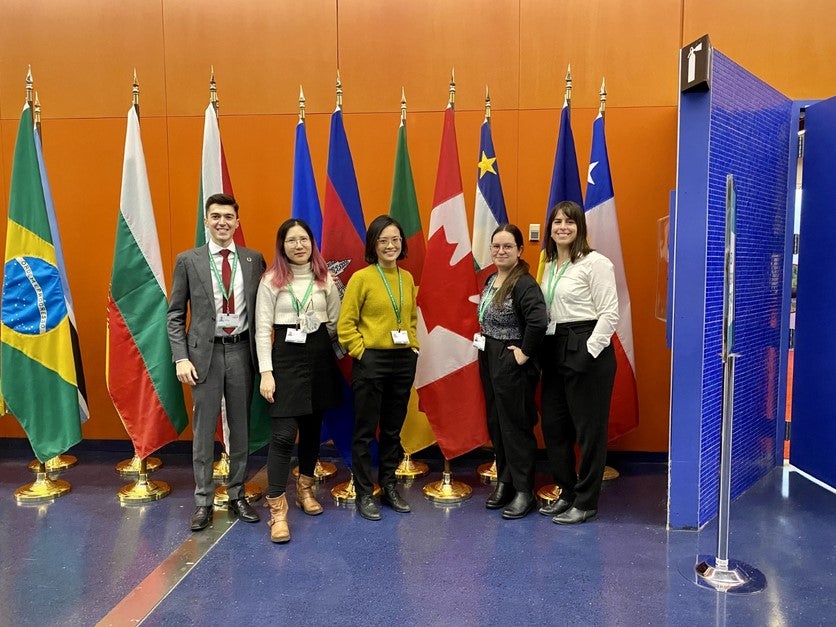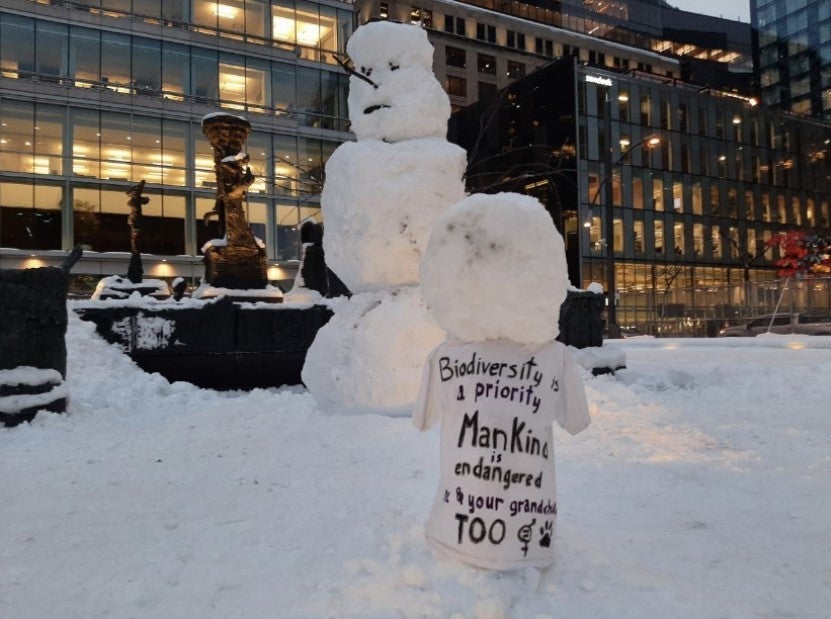COP15 Reflection
By Emma Kirke
This last December, I joined nearly 20,000 delegates representing 190 countries at the 15th meeting of the Conference of the Parties (COP15) to the United Nations Convention on Biological Diversity at the Palais des Congrès in downtown Montréal. Luckily having no final exams, my extended Christmas break was somewhat different than I had pictured it, wearing business casual and meeting with people in my field that I have looked up to for years, including David Suzuki.
As a youth delegate with the United Nations Association of Canada, my role was to listen and learn while bearing witness to what many hope will be the defining moment to halt biodiversity loss and spur monumental efforts to restore what has already been lost.
Referred to as COP 15, this conference marked the second half of a gathering that was intended to take place in 2020 in China. Because of the COVID-19 restrictions in China, it was decided that Montréal would instead play host to the occasion. In part, the conference responded to the success and failures of the Aichi targets, which laid out the framework for the last decade. It follows a history of international failure on the nature file with no single target ever met, including Aichi's.

While many of its goals mirror those of Aichi – albeit with increased ambition – the post-2020 framework also takes a page from the Paris agreement, with countries required to report on their progress annually. This accountability mechanism helps meet countries where they are and recognizes the plurality of challenges on the path to global success. In addition, there is a significant improvement in ensuring that targets are measurable with markers of success. However, with a lack of a mechanism to ensure that governments increase their ambition over time, the agreement's success will rely on domestic pressure within nation-states to hold governments to account for the promises made in Montréal.
Between attending many civil society side events and participating in discussions with other youth delegates, I had the chance to attend various portions of the negotiations, including a dramatic moment during a negotiation on the monitoring framework. A coalition of representatives from countries from the global south walked out over a stalemate the previous evening on financing to support the implementation of the Global Biodiversity Framework in the least developed countries.
I left the conference with mixed emotions. On the one hand, there was landmark recognition of Indigenous peoples' rights and their critical role in protecting biodiversity. Despite accounting for only 5% of the world's population, Indigenous people steward 80% of the world's biodiversity. An important part of conservation work in many of the world’s biodiversity hotspots includes recognizing customary land tenure and granting Indigenous and local communities the right to continue to steward these places. Recognition of such rights in an international agreement that is inevitably the product of a system based on euro-centric norms is a landmark achievement. Canada also announced unprecedented funding for Indigenous-led conservation.
I felt the conference came short regarding the importance of ocean conservation. It is a challenging area to address, given that most of the ocean is outside exclusive economic zones and commercial fisheries often heavily influence negotiations. While oceans are estimated to contain 80% of the world's biodiversity, it is only mentioned twice in the final agreement. I am looking forward to attending the International Marine Protected Areas Conference in February as a youth delegate with the Sustainable Ocean Alliance, where these issues will be further discussed.

Throughout the conference, I gained a new appreciation for the degree of freedom I have in Canada as an advocate in the biodiversity sphere. Participating in civil society events and sessions with the UN’s Special Rapporteur on human rights and the environment David Boyd, I heard from activists from the global south who face risks to their personal security by simply protecting their basic rights to drink safe water or breathe clean air. In particular, the Amazon has become one of the most dangerous places for environmental and land activists with perpetrators often escaping justice as governments have turned a blind eye to abuses. During a discussion session, one activist shared “by protecting one voice, you empower a thousand.”
From a peace perspective, I attended an event on Peace and Biodiversity hosted by UNESCO that highlighted the importance of recognizing how agreement on matters related to the environment can help us find agreement on other issues. In particular, they highlighted the European Greenbelt. Upon the fall of the Berlin Wall and the dissolution of the Soviet Union, places along the former border where fences once were becoming a 12,500 km corridor of habitats. Beyond providing essential habitats, it also connects people once separated and fosters lasting peace. One of the newest members of the Grebel Peace Incubator, Bees for Peace does similar work on a local level. They build community capacity to create native pollinator gardens, providing habitat for bees and bringing diverse people together in common spaces.
Another important issue discussed throughout the conference was the issue of inequity in the nature sphere. In much of North America access to nature for recreation is determined by postal code, affluence, and social identity. During an event on the role of biodiversity in human health practices, multiple participants, including practicing physicians, spoke about the increasing pile of evidence that points to the role of nature in helping people live happier and heathier lives. In the CPA, another incubator participant Green Care Farms provides a therapeutic farm experience for people living with dementia.
Participating in an event on such a large scale in my field was an incredible opportunity. Overall, I left feeling uplifted by my interactions with other youth from across the world who work despite great odds to safeguard the places they call home.